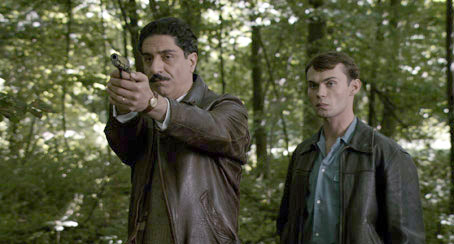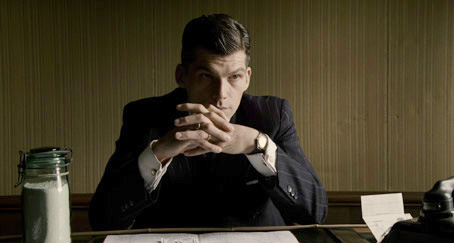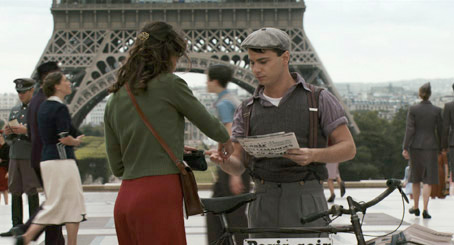| |
"I joined the Army of Liberation as a volunteer, and I die within inches of Victory and the final goal. I wish for happiness for all those who will survive and taste the sweetness of the freedom and peace of tomorrow. I'm sure that the French people, and all those who fight for freedom, will know how to honour our memory with dignity." |
| |
The last letter of Missak Manouchian, written to
his wife Mélinée shortly before his execution. |
| |
"A desperate disease requires a dangerous remedy." |
| |
Guy Fawkes |
Old prejudices die hard. It's been famously stated that one man's terrorist is another man's freedom fighter* and you'll find no better twentieth century example than The French Resistance during World War 2. They certainly fit the modern definition of terrorists, being an armed and organised group who carried out assassinations, bombings and acts of sabotage against the ruling authority. But when that ruling authority is an occupying force dressed in Nazi uniforms, it suddenly becomes easier to sympathise with their cause. And yet I've already seen two reviews of Robert Guédiguian's gripping wartime drama The Army of Crime [L'armée du crime] that take a dim view of the actions of the true-life Resistance fighters whose activities it portrays. Why? Because they were communists, the perennial bogeymen of capitalist societies the world over. For the detractors it's thus not what they did that's the problem, but their political affiliation. Hmm.
Ah, but there's more. The clue is in the opening role call as a group of captured Resistance fighters are driven to their place of execution. These are not French names, but those of people of who have fled to France as "the land of human rights," an underclass of Armenian, Polish, Italian, Romanian, Spanish and Jewish refugees, many of whom had fought against the fascists in the Spanish Civil War. The film's detractors loved that. Hell, these people weren't even born in the country they laid down their lives to help liberate, goddammit.

It's difficult for most of us to imagine life under foreign occupation. We have no reference points, no experiences to draw on for accurate comparison. It's a situation the citizens of post-armistice France were reluctantly forced into when their country came under Nazi rule following the Fall of France in 1940. The nature of the occupation, where the presence of the German soldiers had become a fact of life for most Parisians, is neatly captured early on in Guédiguian's film through brief shots of uniformed soldiers giving public musical performances, posing for photographs at famous landmarks, playing football in the park and exchanging pleasantries with locals like holidaymakers on a day trip. But food shortages, the forced transportation of French workers to Germany, and the increasingly brutal enforcement of unpopular acts saw this artificial image of normalcy crumble, and early acts of passive resistance soon gave way to a more active and organised struggle.
The Army of Crime focuses on key members of a Resistance sub-group known as the FTP-MOI (Francs-tireurs et partisans – main-d'œuvre immigrée). Their eventual leader is Missak Manouchian (Simon Abkarian), a left-wing Albanian poet with pacifist leanings and the key figure here for audience identification. Working independently but later to become key members of Missak's group are Polish Jew and activist Marcel Rayman (Robinson Stévenin, at times looking like a French Jude Law), Romanian Olga Bancic (Olga Legrand), and young Thomas Elek (a chisel-faced Grégoire Leprince-Ringuet), a Hungarian Jew and fervent communist whose parents run a local restaurant. It really helps that the three male leads have such distinctive features, but there are quite a few other names and faces to keep tabs on here, including Missak's wife Mélinée (Virginie Ledoyen), Marcel's pretty red-haired girlfriend Monique (Lola Naymark), seasoned activist Feri Boczov (Ivan Franek), spectacled Resistance go-between Dupont (Horatiu Malaele), and Thomas's mother Madame Elek (Ariane Ascaride). And that's just for starters.
The film begins on the trot and assumes a knowledge of the basic facts of German occupation, and that we thus understand without expository dialogue why a musical rehearsal is timed to cover the sound of a printing press (which is producing, as Missak eloquently tells the police, "pamphlets for denouncing bastards"), or just what it means to receive a police summons when your only crime is to be born a Jew. The stories are cross-cut for pace and storytelling economy, and give us ample time to connect with the characters in preparation for when they start working as an organised unit. That we get to know and sympathise with Missak before he takes his first human life, for example, completely changes our emotional response to the act itself, forcing us to share his fear and stomach-turning reluctance to take part in an action that would pass by as incidental in the average war film, with the camera lingering on the bodies of the fallen as Missak soberly contemplates the irreversible step he has been pressured to take. This plays in stark contrast to the earlier shootings and book store bombing carried out by Marcel and Thomas (that the bomb is hidden in a copy of Das Kapital is a nice touch), random acts fuelled more by anger than specific purpose that risk doing the cause more harm than good. It's little wonder that the Resistance hierarchy initially react negatively to Missak's insistence that they be part of his team.

Guédiguian doesn't see things in black and white terms and does not shy away from showing the collaboration of the French police, who assist the occupying forces in rounding up Jews and hunting down the Resistance fighters. As a smiling kingpin in the Special Brigade, the coldly ruthless Commissaire David is as close as the film gets to a stock character, but a controlled performance by Yann Trégouët keeps him creepily credible, and while dour-faced Inspector Pujol (Jean-Pierre Darroussin) quietly balks at the sight of a man he helped to capture being viciously tortured, the promise of career advancement is all that it takes to keep him on board. And in one of the film's most slyly effective comments on complicity, one of the activists is caught when he flees the police and is deliberately tripped up by café customer.
Some unfair but inevitable comparisons have been drawn between this film and Jean-Pierre Melville's 1969 Resistance classic Army in the Shadows – indeed, director Guédiguian admits that his choice of title was partly influenced by a film he regards as a masterpiece.** But in focusing on the personal stories of its specific group of Resistance fighters, Army of Crime is a very different film and able to stand on its own considerable merits. The matter-of-fact manner in which the story is told is both respectful to the men and women whose lives it portrays (some timeline changes have been made for dramatic effect, but much of what is chronicled here is close to the truth) and avoids romanticising them or their actions. Guédiguian directs with an almost invisible hand, his camera placement unobtrusive, his editing economical and his command of the multiple story strands and characters assured. He's aided considerably by some savvy casting and strong performances across the board from a cast who really understand the value of restraint, while his businesslike approach to violence on both sides keeps it grounded in reality and never gratuitous – one brief but horrific torture scene is all that's needed to vividly suggest what Missak and his fighters were later to suffer at Special Brigade hands.
It's the commitment and sacrifice of the partisans that gives this consistently involving story of camaraderie and unsung heroism its humanity and emotional gravitas, something recognised by Guédiguian in his focus on character over action or plot twists. It's not without its poetic moments – a subjective cutaway to a window during the torture scene is particularly effective – and at one point it even risks making light of the struggle with a blackly comic scene in which three fighters in succession abandon a grenade attack because their target is surrounded by women and, unable to locate the discarded pin, have to walk home clutching the grenade and render it safe with a knitting needle. It's rather nice to hear in the extras from one of the men who took part in this botched attack that every bit of this seemingly fanciful story is true.
There are some serious challenges set for a digital transfer by this film in the night-time scenes, which have none of that familiar fake moonlight brightness and include street shots where only some of the image is designed to register – if you're looking for a barometer of your TV's contrast and brightness range then this is it. Much of the interior lighting is unsurprisingly subdued, and key scenes are set at night, but the transfer copes well with both, with no obvious loss of detail or compression issues. In the sunlit street exteriors the transfer really shines, boasting a well balanced contrast range and a crisp level of detail that never looks artificially enhanced. The brownish hues that are almost par for the course with wartime dramas are nicely reproduced.

There are two DTS tracks here, but you'll only have access to the lossless HD track if you're running you sound though an appropriate amp via HDMI. As expected, the clarity and dynamic range are excellent, with music, dialogue and effects all very nicely reproduced. The score makes more use of the surrounds than the effects, although a grenade attack on a German coach sends splinters around the room and gives the subwoofer and brief but punchy wake-up call.
It's worth noting here that not all of the extra features on the Blu-ray release are included on the DVD version. The following three appear on both.
Interview with Robert Guédiguian (14:58)
Filmed in the Cambridge Arts Picturehouse at the Cambridge Film Festival on 17th September 2009, Guédiguian talks about the importance of the story, Missak's final letter to Mélinée, his selection of actors, recreating 1940s Paris, the fictitious elements and his concern that left-wing stories are gradually being forgotten. He also discusses his opposition to the modern industrial approach to filmmaking and cannily suggests that Hollywood movies actually don't deal that well with America.
Army of Crime at Cannes 2009 (4:09)
A familiar inclusion on discs of European films that consists the director and cast walking the red carpet, posing for photos and taking their bows before the Cannes screening.
Trailer (1:59)
A solid enough sell and the only extra here in 1080p.
The rest of the extras are all exclusive to the Blu-ray edition.
Meeting Verginie Ledoyen & Simon Abkarian (21:07)
The two lead actors are interviewed at Cannes about the story and characters, playing their roles and the increasing depoliticising of the younger generation, who they believe are encouraged to go where the money is and think individually rather than collectively. A wandering Steadicam provides intermittent visual distraction.
Meeting a Survivor: Henri Karayan (29:30)
If you're looking for a reason to choose the Blu-ray over the DVD beyond picture and sound quality then this is it. Henri Karayan, a surviving member of the Manouchian group, recalls his time as a Resistance fighter to director Guédiguian and the enthralled lead actors. A lively talker in spite of his physical infirmity, his stories are revealing, sometimes unsettling but always fascinating, and cover everything from joining the Resistance to the act of killing an enemy. He confirms the truth the film's blackly comic grenade scene and states that Marcel Rayman "was the best of us." One suspects Karayan is deserving of a documentary of his own. Excellent.
Rendez-vous with Robert Guédiguian and Ariane Ascaride (French Communist Party Meeting) (43:33)
I'm sure that title alone will have conservative viewers twitching with horror, but this is not an ideological discussion but an on-stage Q&A in which director Guédiguian and actress Ariane Ascaride (who plays Madame Elek) are interviewed by L'Humanité journalist Charles Sylvestre about the film shortly before its release. There's plenty of useful stuff here not covered in the solo interview, while key points from there are eloquently re-emphasised. It concludes with a warm reaction to the film from the elderly Edmonde Charles-Roux, President of the Société des Amis de l'Huma.
Also included are tools to check your home cinema set-up and correctly adjust the brightness and contrast of your screen.
A solidly crafted, convincingly performed and compellingly told true story of commitment and sacrifice that deserves to reach a wider audience than it probably will. I've not seen the DVD, but on the evidence in front of me the Blu-ray is definitely the way to go, for the detailed and well judged transfer and for the additional extra features, with the Henri Karayan piece the cream of the crop. Recommended.
* The original quote was apparently "One man's terrorist is another man's revolutionary" and first coined by Walter Laqueur in the opening chapter of his book, Age of Terrorism.
** The actual source of the title, however, was the notorious 'Affiche Rouge' (Red Poster) issued after the execution of the members of Missak's group in an attempt to denounce them and carrying the words: "Des libérateurs? La libération par l'armée du crime!" which translates as "Liberators? Liberation by the army of crime!"
|